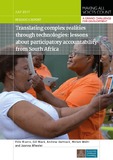| dc.contributor.author | Bivens, Felix | |
| dc.contributor.author | Black, Gill | |
| dc.contributor.author | Hartnack, Andrew | |
| dc.contributor.author | Waltz, Miriam | |
| dc.contributor.author | Wheeler, Joanna | |
| dc.coverage.spatial | South Africa | en |
| dc.date.accessioned | 2017-07-28T09:22:39Z | |
| dc.date.available | 2017-07-28T09:22:39Z | |
| dc.date.issued | 2017-07 | |
| dc.identifier.citation | Bivens, F.; Black, G.; Hartnack, A.; Waltz, M. and Wheeler, J. (2017) Translating complex realities through technologies: lessons about participatory accountability from South Africa, Making All Voices Count Research Report, Brighton: IDS. | en |
| dc.identifier.uri | https://opendocs.ids.ac.uk/opendocs/handle/20.500.12413/13127 | |
| dc.description.abstract | Accountability is a complex issue in South Africa. The country has high levels of inequality, and marginalised groups struggle to make themselves heard by those in power. Yet the issue is further complicated by an interacting set of factors, including the legacy of apartheid, gender and religious issues, and the lack of access to those in power. Through a six-year research project, the Sustainable Livelihoods Foundation (SLF) used a range of technology-enabled participatory processes to unpack this lack of government accountability. This report focuses on four case studies, which examined the lived realities of marginalised groups and the activists that campaign on their behalf: activists against gender-based violence and for community safety; community care workers and health committee members working for public health; informal traders and the informal economy; and traditional medicine, Rastafarian bossie doktors and indigenous rights. SLF supported these groups to work together and identify the accountability issues that they felt were important, and then consider how they could raise their voice collectively to those that shape and implement policy. The process strengthened the capacity of these groups to speak out – not least through the use of different participatory technologies including digital storytelling, film making, PhotoVoice, geospatial mapping and infographics. This report reflects on the different tools used, considering the effectiveness of the outputs generated and how these tools can empower citizens and bring marginalised groups together. Lastly, the report reflects on SLF’s role as an intermediary organisation, and how this role can influence the path that marginalised groups take in their efforts to make government more responsive to their needs. | en |
| dc.description.sponsorship | DFID | en |
| dc.description.sponsorship | USAID | en |
| dc.description.sponsorship | Sida | en |
| dc.description.sponsorship | Omidyar Network | en |
| dc.language.iso | en | en |
| dc.publisher | Institute of Development Studies | en |
| dc.rights.uri | http://creativecommons.org/licenses/by-nc-nd/4.0/ | en |
| dc.subject | Governance | en |
| dc.subject | Participation | en |
| dc.subject | Technology | en |
| dc.title | Translating complex realities through technologies: lessons about participatory accountability from South Africa | en |
| dc.type | Series paper (non-IDS) | en |
| rioxxterms.funder | Default funder | en |
| rioxxterms.identifier.project | Default project | en |
| rioxxterms.version | AM | en |
| rioxxterms.funder.project | 9ce4e4dc-26e9-4d78-96e9-15e4dcac0642 | en |


